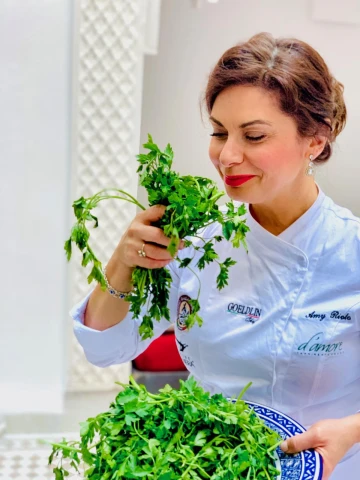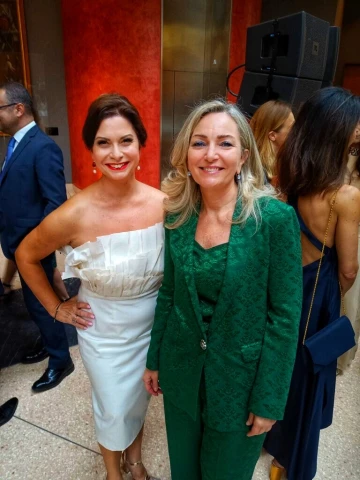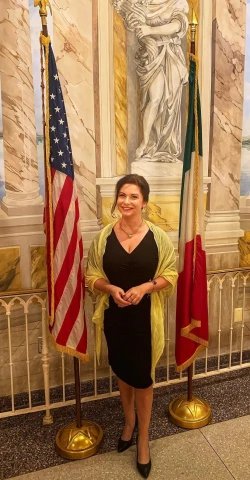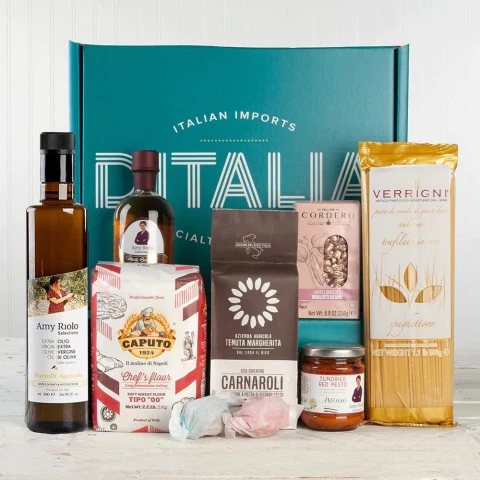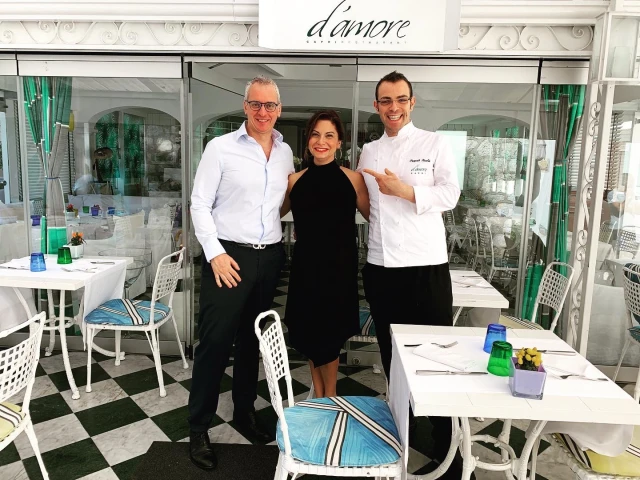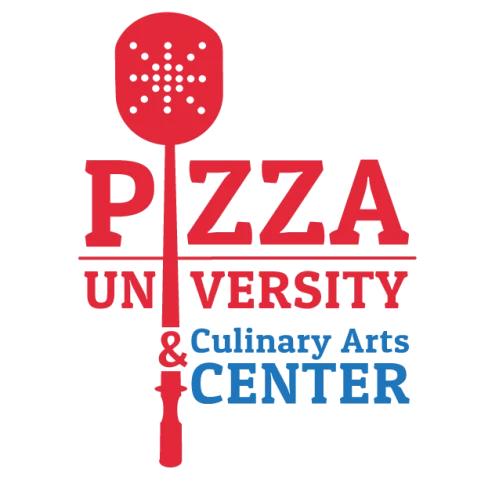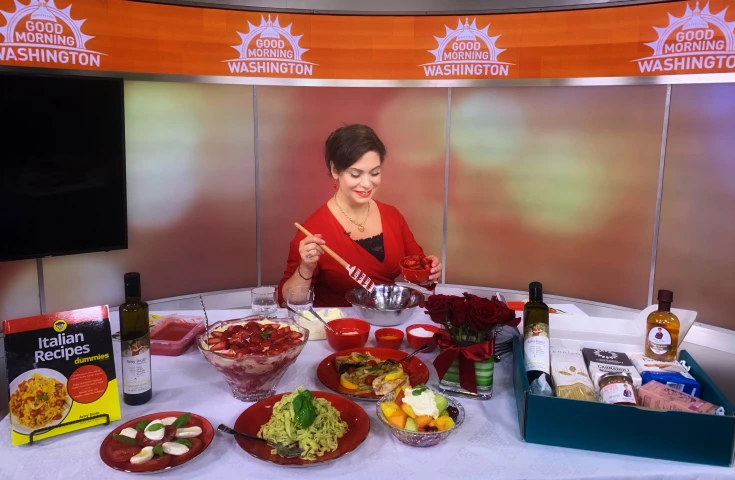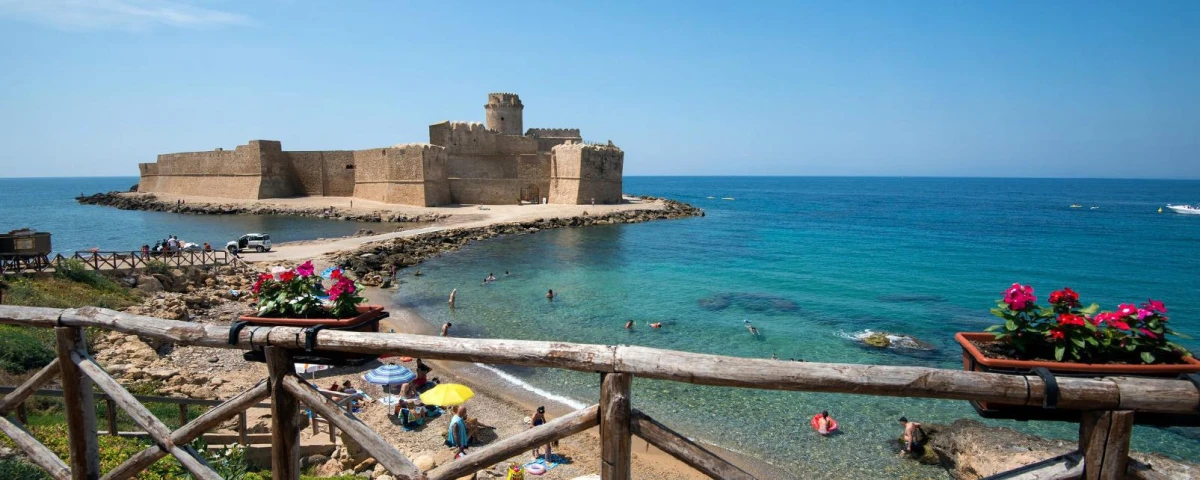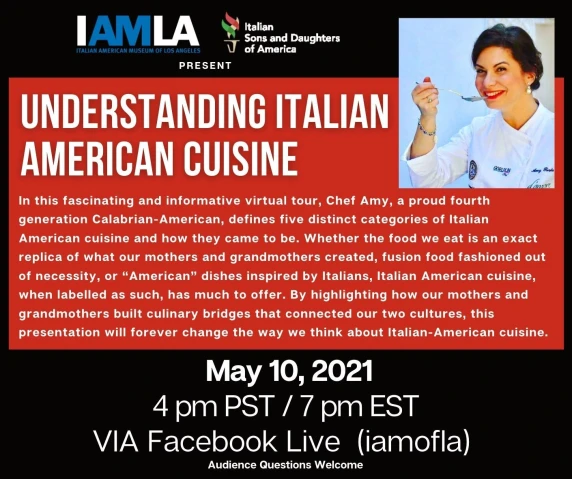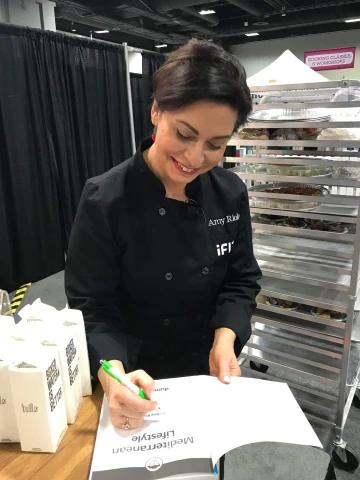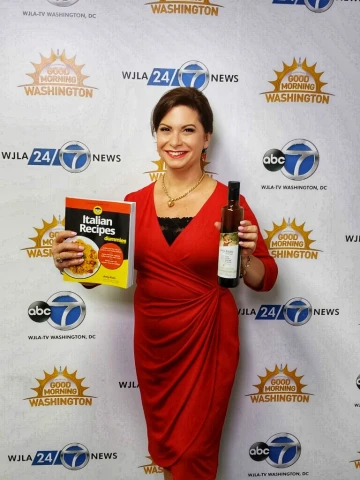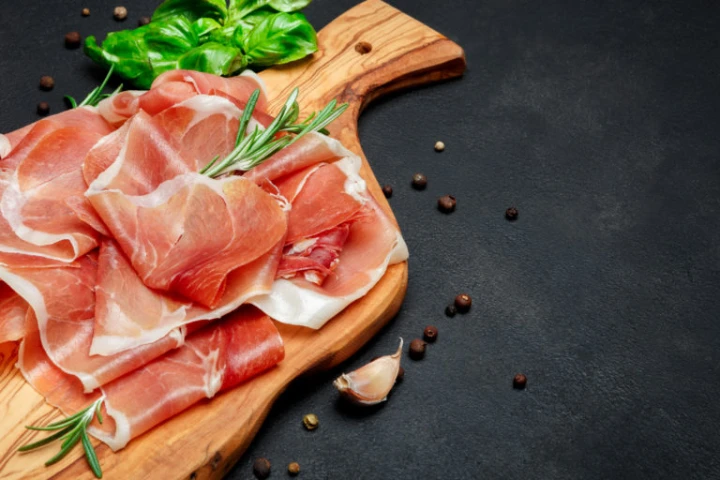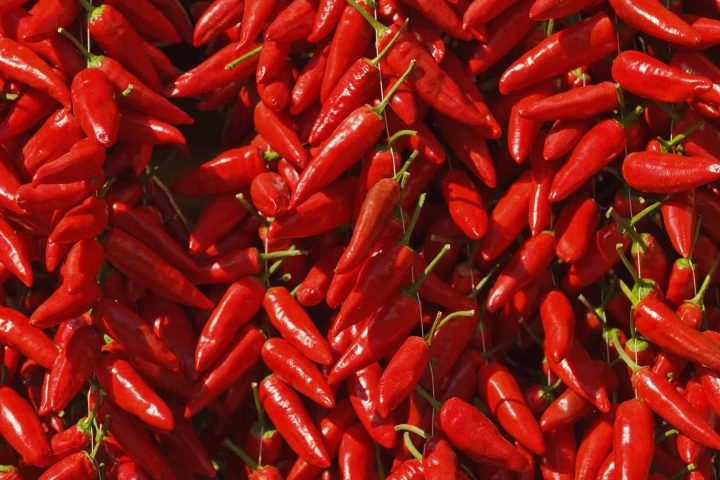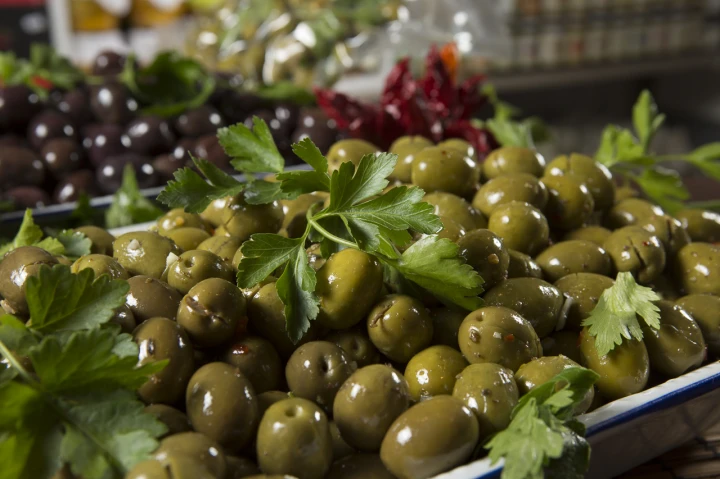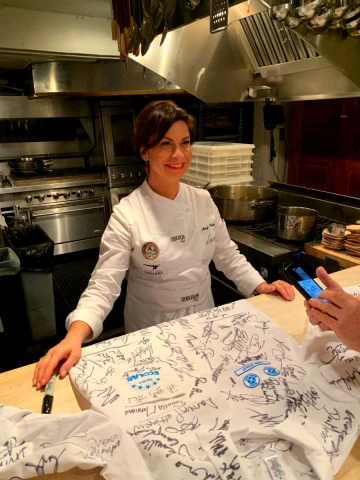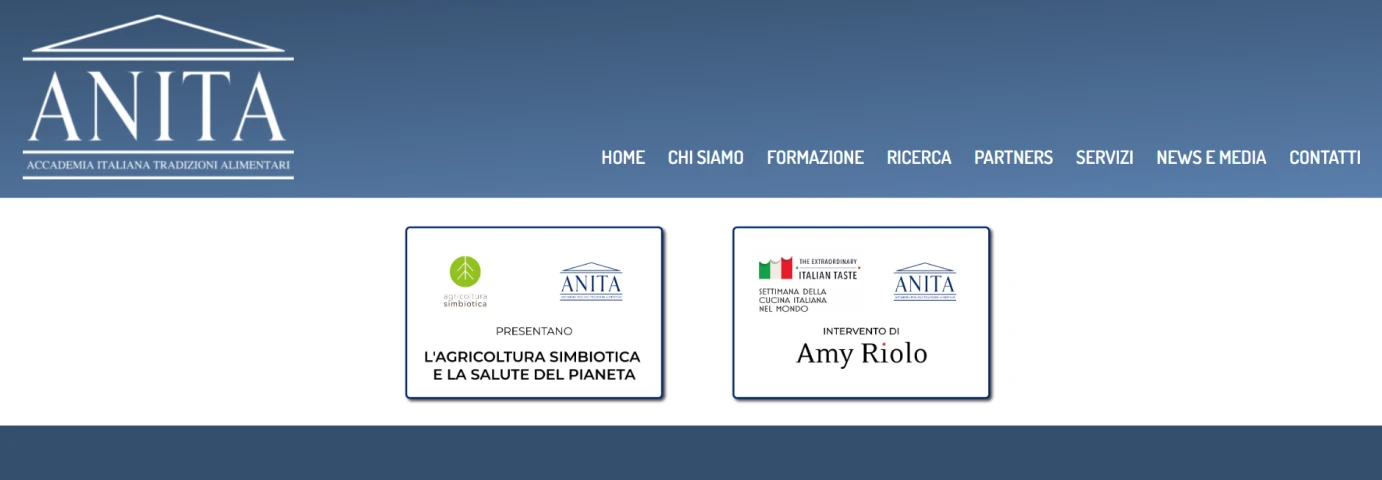This interview is a collective one. Or maybe not. We’ll talk with a chef, a television star, a food historian, a culinary anthropologist and a Mediterranean Diet advocate. All in one person, a wonderful Italian American woman.
Amy Riolo has such a beautiful and contagious smile, in a time when contagious is not a word we use lightly. Luckily for us, and for the incredible number of people who knows her via the numerous and successful things she does, she won’t stop smiling and sharing her passion, her Italian passion, with all of us.
Good morning Amy, and thanks for being with us. As a first question, I would like to ask you to tell us something about yourself and your Italian-ness: where were you born, in what part of Italy do you have your origins?
Good morning to you! It is a pleasure to be interviewed by you! I would be happy to tell you about my Italian-ness! I was born in Jamestown, New York. I am a fourth-generation Italian American, with great-grandparents from Calabria on both sides. In the little town I grew up in, most people had roots in Sweden or in Sicily and I remember thinking about what distinguished us as Italian even as young as age three.
Usually Italian American women and men learn their first cooking lessons in the family. Was that the case for you as well?
Yes! All of my family played a role in my culinary education from the start. My mom used to sit me on the counter and let me roll meatballs and Italian cookies with her. My maternal grandmother taught me to make Easter bread and Christmas cookies. My father used to watch National Geographic with me and we would discuss what the different people of the world would eat. My paternal grandfather was a cook in the military, so I used to cook with him as well since he lived next door. He was used to rations in World War II, and was always challenging me to cook with substitutions or missing ingredients. I used to hate it as a kid, but it became really important in my career and in cooking around the world. I never got to cook with my paternal grandmother, who passed away when I was only three, but they tell me that she loved baking like I do. My grandfather remarried a Greek lady, and she became my YiaYia. I learned traditional Greek recipes, religions, and customs from her. Of course, as you know, Calabria was the core of Magna Grecia, so it was an extension of my (Italian) roots.
I’d like to start from the art of cooking, even if of course you’re much more a chef, as if being a chef wasn't already something wonderful and challenging. What is your relationship with cooking, with food, with the art of creating dishes from ingredients that you choose, process, cook, bring together and combine?
One of my friends, the great African American poet and activist E. Ethelbert Miller, wrote these lines for me; “There are love notes in the kitchen, just heat and serve.” I love them because I do believe that food is edible love that we can demonstrate to everyone. I firmly believe that each meal is an opportunity to honor our ancestors, our communities, our world, and ourselves. That sentiment is with me from the time I start planning a meal or a dish through when I cook it and serve it. Fortunately, this is the essence of genuine Italian cooking, so I am not alone. I like the way that you asked this question because cooking isn’t about just one thing, it is about all of the subjects in the world combined; science, accounting, art, history, culture, nutrition, mathematics, philosophy, diplomacy, etc., etc., and your question shows that you understand this.
Personally, there are several factors that I enjoy the most, beginning with making the menus. I often think of a sentiment or a poem that I would like to express with my meal, and then I begin to plan. There are few things I love more than writing menus. In cooking the food, I like the challenge of being able to coax the maximum flavor, nostalgia, and health benefits out of a few ingredients. I like to use food to create a positive emotional shift in myself and others.
When I am writing, I want my readers to learn about history and health while being able to recreate my dishes or ideas at home. I like to say that by the time you finish reading one of my books, you will not only know about the food and history of a certain place, but of the people who created them.
As I was saying, you are much more than a chef. You are a food historian, a culinary anthropologist and a Mediterranean Diet advocate. You are a successful writer, and a media personality, and educator. Can you please describe how do you do all of this to our readers?
I hope so! I jokingly say that I have occupationally-imposed ADHD, which means that I need to juggle a lot of different ideas at the same time in order to stay satisfied and be creative, but I know that other people focus in different ways. I am fortunate to have built my career in a way that many parts of it organically overlap nowadays. I spent a decade researching culinary history, and more time than that writing and presenting on the anthropological aspects on how people eat for universities, the Library of Congress, embassies, and organizations like the Smithsonian and National Geographic. I am able to incorporate that work into my writing, educating, and filming.
I never set out to do all of these different things. The only thing that I knew was that I was more interested in educating people than in the day to day operations of running a restaurant, so in 2007 I made a vow to myself that I would find a way to make writing about the things I love be my livelihood. My mentor told me that I would never make enough money to support myself from writing alone (many people hold this belief in the US), so I should try to do three things at once. At the time, the three things were write books, teach, and write magazine articles. They wall worked together and paved my career path.
Over the years the “three things” have changed due to the market and technology. In terms of time, it is my books, the private culinary tours that I lead to Italy, Greece, and Morocco, selling my own line of top-quality Italian products called Amy Riolo Selections, and working as a brand ambassador for organizations such as the Maryland University of Integrative Health, Ristorante d’Amore in Capri, and the Pizza University & Culinary Arts Center that keep me the most busy.
I am also the Co-Founder and Managing Director of a company called ISE, LLC which helps Italian companies market and promote their products in the US. To answer your question about how I do everything, I would have to say that I work a lot more than most people. Even though what I do is fun, and I love it so much that sometimes it doesn’t feel like work, it still is. The logistics behind what I do alone is a full time job, let alone the actual work. I usually work 6 days a week, and up until the pandemic, I was always working 7 days.
I have a different schedule every day, but I try to schedule in time for what brings me joy. I keep detailed lists and schedules and have learned to break down the big projects into daily work so that I don’t miss deadlines. Most days consist of a combination of cooking, baking, writing, communications, meetings, podcasts and interviews, media queries, marketing efforts for my books and products. I usually film once a week, which involves its’ own prep work.
How much of being Italian is fundamental for your work?
Being Italian is fundamental to my very existence. I don’t know what it would be like to be anything else. I have always had a strong desire to create, to see more beauty, and to care for others in a way that is very typical in Italy. Even my love of the past and history, my desire to follow in my great-grandparents footsteps and desire to pass traditions down is integral to everything to me. The feeling of being “at home” only ever occurs to me when I am in Italy. I get it in Crotone, Calabria when I see the Ionian Sea or when I walk through the centro storico where my grandfather used to live. There is a deep sense of belonging that I get from my relatives in Italy that affects me at a core level. It is like I was always missing something until I went there and met them. It is as if Calabria created my sensibilities and all of Italy confirms them. I have written about many topics, countries, and cultures, but it is my Italian sensibilities (love of beauty, art, la buona tavola, and history) and a deep desire to foster harmony that informs my work the most.
In the practical sense, I also work in Italy a great deal. I have business partners in Abruzzo and Molise. Relatives in Rome and Calabria. Producers of my Amy Riolo Selections products in Liguria and Emilia Romagna, and friends and colleagues everywhere, especially Napoli. Nowadays I spend more time speaking Italian on a daily basis in the US than I do English because I am in constant contact with Italy.
How difficult is it to educate the American people to the original Italian culinary culture, with all its characteristics?
Educating Americans is not difficult at all, because generally speaking, especially in the Washington, DC area where I live, people are interested, curious, and want to learn. What is extremely difficult is “undoing” more than a century of mis-information about Italian food in this country. In this lecture that I did for the Italian American Museum of LA, you can see how prejudice and industrialization, as well as a need for a new consumer market caused all kinds of incorrect information about Italians and Italian food to become common in the US.
When you combine that with restaurants and food product companies that want to make money off of the Made in Italy brand without putting the quality and craftmanship behind their dishes and labels, it is no wonder people are confused. Even the Italian Americans are confused. Fortunately, I have dedicated my life to this, as have many other passionate and qualified people, and together we will help people to be able to discern what is authentic so that they can make better choices to live and eat in a better and more healthful manner.
If you were to describe the difference between Italian and Italian American cuisine, what words would you use?
Quality vs. Quantity. In Italy quality has always prevailed over quantity. In the US, it is the other way around, and the food of all immigrant groups, not only Italians, fall victim to this. When it comes to food, the biggest usually does not mean the best. It’s better to spend money on the best produce and ingredients you can, and use less of them to be healthier and happier.
You mentioned this earlier: what is your idea of the problem of Italian sounding, the use of products that pretend to be Italian but are not, and which does enormous economic damage to the export of real Italian products?
In my newly released 11th book, Italian Recipes For Dummies, I have an entire section called “Stocking an Italian Pantry” which includes info on “Identifying Prized Italian Products and “Learning to Read Labels to Get More For Your Money.” I have also led conferences and written magazine articles for the topic. The truth of the matter is that if you buy the genuine products, you are guaranteed that they are made according to standards and traditions which not only keep communities thriving economically, but are part of a healthful lifestyle. If you are buying a fake Italian cheese, for example, that is full of chemicals to maintain its’ color and preservatives to maintain is’ freshness, made with milk that wouldn’t be permissible for drinking in Italy and not aged properly, you are getting scammed, not saving money. It infuriates me that companies are allowed to falsify information on labels, use misleading terms and often misspell Italian words so that they can make a profit. This is especially harmful to Italian Americans who over a century ago were forced to eat “American” food in the slums in New York by doctor-led campaigns to transform them into healthy Americans, and now are being offered fake Italian products. There are four and five generations of Italians in this country who lost both their culinary culture and their connection to the language.
What is the future of Italian cuisine in the United States, I mean the trend toward which our cuisine is evolving in the restaurants that continue to open in large numbers in America?
I see several new trends: 1) Italian ingredients in American restaurants – the use of Prosciutto di Parma, Calabrian peppers, and olives from Sicily, for example, is growing, even in non-Italian restaurants because people love the flavors. 2) New Italian Cuisine – a lot of Italian restaurateurs are opening up hip eateries and using Italian products in the American style, such as “burgers” made out of stracotto di manzo and serving Italian potato croquettes along with them instead of fries. Or they will offer a ham and cheese sandwich made out of prosciutto and Italian cheese instead of American ones. Others are making things like the classic American breakfast French Toast with Panettone instead of bread. 3) Pizza – Neapolitan and Neo-Neapolitan pizza trucks, restaurants, and to-go options in cafeterias and supermarkets continue to grow. 4) Street Food – Cibo di strada is growing in popularity in the US and many chefs are opening these types of restaurants instead of fine dining.
And what's in Amy Riolo's future instead?
Many more books, new Amy Riolo Selections products, and a new filming project.
Are there any new upcoming ventures that you would like to give our readers a preview of?
Yes! I am now working on my 12th book – Diabetes for Dummies, a medical book which teaches what everyone needs to know to avoid getting diabetes, or to live their best life once they are diagnosed. I’m writing the recipes for it as we speak. I am honored to co-write this book with Dr. Simon Poole. Last year I became a founding member of A.N.I.T.A. (Accademia Nazionale Italiana Tradizioni Alimentari), and I am also looking forward to exciting initiatives with them.
The last question is necessary, I hope you will forgive me but I have to ask it: sauce or gravy?
Sugo, sempre! LOL! That is my way of being politically correct and avoiding the topic. We always used the word sugo, but I use sauce in English. I am more concerned with how Italian Americans make there sauce than what they call it.
Questa è un’intervista collettiva. O forse no. Parleremo con una chef, una star televisiva, una scrittrice di successo, una storica del cibo, un'antropologa culinaria, un’educatrice e una sostenitrice della Dieta Mediterranea. Tutto in una sola persona, una meravigliosa donna italoamericana.
Amy Riolo ha un sorriso molto bello e contagioso, in un'epoca in cui contagioso non è una parola che si usa con leggerezza. Per nostra fortuna, e per l'incredibile numero di persone che la conoscono attraverso le tantissime attività di successo che svolge, non smette di sorridere e di condividere la sua passione, la sua passione italiana, con tutti noi.
Buongiorno Amy e grazie per essere qui con noi. Come prima domanda, vorrei chiederti di raccontarci qualcosa di te e della tua italianità: dove sei nata, in quale parte d'Italia hai le tue origini?
Buongiorno a te! È un piacere essere intervistata da te! Sono felice di parlarti della mia italianità! Sono nata a Jamestown, nello Stato di New York. Sono un'italoamericana di quarta generazione, con bisnonni calabresi da entrambe le parti. Nella cittadina in cui sono cresciuta, la maggior parte delle persone aveva radici in Svezia o in Sicilia e ricordo di aver pensato a ciò che ci distingueva come italiani già all'età di tre anni.
Di solito le donne e gli uomini italoamericani imparano le prime lezioni di cucina in famiglia. È stato così anche per te?
Sì! Tutta la mia famiglia ha avuto un ruolo nella mia educazione culinaria fin dall'inizio. Mia madre mi faceva sedere sul bancone e mi lasciava arrotolare polpette e biscotti italiani con lei. La mia nonna materna mi ha insegnato a fare il pane di Pasqua e i biscotti di Natale. Mio padre guardava con me il National Geographic e discutevamo su cosa mangiassero i diversi popoli del mondo. Mio nonno paterno era un cuoco dell'esercito, quindi cucinavo anche con lui, visto che abitava nella casa accanto. Era abituato ai razionamenti della Seconda Guerra Mondiale e mi sfidava sempre a cucinare trovando il modo di sostituire qualche ingrediente che mancava. Da bambina odiavo questa cosa, ma è diventato molto importante nella mia carriera e nel portare la mia cucina in giro per il mondo. Non ho mai avuto modo di cucinare con la mia nonna paterna, che è morta quando avevo solo tre anni, ma mi hanno detto che amava cucinare come me. Mio nonno si è risposato con una signora greca, che è diventata la mia YiaYia. Da lei ho imparato le ricette tradizionali greche, le religioni e le usanze. Naturalmente, come sapete, la Calabria era il cuore della Magna Grecia, quindi era un'estensione delle mie radici (italiane).
Vorrei partire dall'arte di cucinare, anche se ovviamente tu sei molto più di una chef, come se essere “solo” una chef non fosse già qualcosa di meraviglioso e impegnativo. Qual è il tuo rapporto con la cucina, con il cibo, con l'arte di creare piatti a partire da ingredienti che scegli, elabori, cuoci, metti insieme e combini?
Uno dei miei amici, il grande poeta e attivista afroamericano, E. Ethelbert Miller, ha scritto per me questi versi: “There are love notes in the kitchen, just heat and serve.” (Ci sono note d'amore in cucina, basta scaldare e servire). Li adoro perché credo che il cibo sia amore commestibile che possiamo dimostrare a tutti. Credo fermamente che ogni pasto sia un'opportunità per onorare i nostri antenati, le nostre comunità, il nostro mondo e noi stessi. Questo sentimento mi accompagna dal momento in cui inizio a pianificare un pasto o un piatto fino a quando lo cucino e lo servo. Fortunatamente, questa è l'essenza della vera cucina italiana, quindi non sono sola. Mi piace il modo in cui hai posto questa domanda, perché la cucina non riguarda una sola cosa, ma tutte le materie del mondo messe insieme: scienza, contabilità, arte, storia, cultura, alimentazione, matematica, filosofia, diplomazia, ecc. ecc. e la tua domanda dimostra che lo capisci.
Personalmente, sono diversi i fattori che mi divertono di più, a cominciare dalla creazione dei menu. Spesso penso a un sentimento o a una poesia che vorrei esprimere con il mio pasto, e poi inizio a pianificare. Ci sono poche cose che amo di più che scrivere i menu. Per quanto riguarda la cucina, mi piace la sfida di riuscire a ottenere il massimo del sapore, della nostalgia e dei benefici per la salute da pochi ingredienti. Mi piace usare il cibo per creare un cambiamento emotivo positivo in me e negli altri.
Quando scrivo, voglio che i miei lettori imparino la storia e la salute e che possano ricreare i miei piatti o le mie idee a casa. Mi piace dire che quando avrete finito di leggere uno dei miei libri, non solo conoscerete il cibo e la storia di un certo luogo, ma anche le persone che li hanno creati.
Come dicevo, tu sei molto più di una chef. Sei una storica dell'alimentazione, un’antropologa culinaria e una sostenitrice della dieta mediterranea. Sei una scrittrice di successo, una apprezzatissima personalità mediatica e una educatrice. Come fai a fare tutto questo insieme?
Lo spero! Scherzosamente dico che ho un'ADHD (Disturbo da Deficit di Attenzione Iperattività) imposta dal lavoro, il che significa che devo destreggiarmi tra molte idee diverse allo stesso tempo per rimanere soddisfatta ed essere creativa, ma so che altre persone si concentrano in modi diversi. Ho la fortuna di aver costruito la mia carriera in modo che molte parti di essa si sovrappongano organicamente al giorno d'oggi. Ho trascorso un decennio a fare ricerche sulla storia della cucina e molto altro tempo a scrivere e presentare gli aspetti antropologici del modo in cui le persone mangiano per università, la Biblioteca del Congresso, ambasciate e organizzazioni come lo Smithsonian e il National Geographic. Sono in grado di incorporare questo lavoro nella scrittura, nell'educazione e nelle riprese.
Non ho mai pensato di fare tutte queste cose diverse. L'unica cosa che sapevo era che ero più interessata a educare le persone che a gestire un ristorante giorno per giorno, così nel 2007 ho fatto un voto a me stessa: avrei trovato un modo per far sì che scrivere delle cose che amo fosse il modo in cui mi guadagnavo da vivere. Il mio mentore mi disse che non avrei mai guadagnato abbastanza soldi per mantenermi solo con la scrittura (negli Stati Uniti sono in molti a pensarlo), quindi avrei dovuto cercare di fare tre cose contemporaneamente. All'epoca, le tre cose erano scrivere libri, insegnare e scrivere articoli per riviste. Queste tre cose hanno funzionato insieme e hanno dato vita al mio percorso professionale.
Nel corso degli anni le "tre cose" sono cambiate a causa del mercato e della tecnologia. In termini di tempo, ciò che mi tiene maggiormente impegnata oggi sono i miei libri, i tour culinari privati che conduco in Italia, Grecia e Marocco, la vendita della mia linea di prodotti italiani di alta qualità chiamata Amy Riolo Selections e il lavoro come ambasciatrice del marchio per organizzazioni come la Maryland University of Integrative Health, il Ristorante d'Amore a Capri e la Pizza University & Culinary Arts Center.
Sono anche cofondatore e amministratore delegato di una società chiamata ISE, LLC che aiuta le aziende italiane a commercializzare e promuovere i loro prodotti negli Stati Uniti. Per rispondere alla domanda su come faccio a fare tutto, devo dire che lavoro molto più della maggior parte delle persone. Anche se quello che faccio è divertente e mi piace così tanto che a volte non sembra un lavoro, lo è comunque. Solo la logistica di ciò che faccio è un lavoro a tempo pieno, per non parlare del lavoro vero e proprio. Di solito lavoro 6 giorni alla settimana, e fino alla pandemia lavoravo sempre 7 giorni su 7.
Ho un programma diverso ogni giorno, ma cerco di dedicare del tempo a ciò che mi dà gioia. Tengo elenchi e programmi dettagliati e ho imparato a suddividere i grandi progetti in lavoro giornaliero per non perdere le scadenze. La maggior parte delle giornate consiste in una combinazione di cucina, pasticceria, scrittura, comunicazione, riunioni, podcast e interviste, richieste ai media, attività di marketing per i miei libri e prodotti. Di solito filmo una volta alla settimana, il che comporta un lavoro di preparazione.
Quanto l'essere italiana è fondamentale per il tuo lavoro?
Essere italiana è fondamentale per la mia stessa esistenza. Non so cosa significherebbe essere un'altra persona. Ho sempre avuto un forte desiderio di creare, di vedere più bellezza e di prendermi cura degli altri in un modo che è molto tipico dell'Italia. Anche l'amore per il passato e la storia, il desiderio di seguire le orme dei miei bisnonni e la voglia di tramandare le tradizioni sono per me parte integrante di tutto. La sensazione di essere "a casa" la provo solo quando sono in Italia. La provo a Crotone, in Calabria, quando vedo il Mar Ionio o quando cammino nel centro storico dove viveva mio nonno. C'è un grandissimo senso di appartenenza che mi trasmettono i miei parenti in Italia e che mi tocca nel profondo. È come se mi fosse sempre mancato qualcosa finché non sono andata lì e li ho incontrati. È come se la Calabria avesse creato la mia sensibilità e tutta l'Italia la confermasse. Ho scritto di molti argomenti, Paesi e culture, ma è la mia sensibilità italiana (l'amore per la bellezza, l'arte, la buona tavola e la storia) e il profondo desiderio di promuovere l'armonia che contraddistinguono maggiormente il mio lavoro.
Anche dal punto di vista pratico, lavoro molto in Italia. Ho partner commerciali in Abruzzo e in Molise. Parenti a Roma e in Calabria. Produttori dei miei prodotti Amy Riolo Selections in Liguria e in Emilia Romagna, e amici e colleghi ovunque, soprattutto a Napoli. Oggi negli Stati Uniti passo più tempo a parlare in italiano che in inglese, perché sono in costante contatto con l'Italia.
Quanto è difficile educare il popolo americano alla cultura culinaria italiana originale, con tutte le sue caratteristiche?
Educare gli americani non è affatto difficile, perché in generale, soprattutto nella zona di Washington DC, dove vivo, la gente è interessata, curiosa e vuole imparare. Quello che è estremamente difficile è "disfare" più di un secolo di disinformazione sul cibo italiano in questo Paese. In questa conferenza che ho tenuto per l'Italian American Museum di Los Angeles, si può capire come il pregiudizio, l'industrializzazione e la necessità di un nuovo mercato di consumatori abbiano fatto sì che negli Stati Uniti si diffondessero informazioni errate sugli italiani e sul cibo italiano.
Se a questo si aggiungono ristoranti e aziende alimentari che vogliono fare soldi con il marchio Made in Italy senza mettere la qualità e l'artigianalità dietro i loro piatti e le loro etichette, non c'è da stupirsi che la gente sia confusa. Anche gli italoamericani sono confusi. Fortunatamente ho dedicato la mia vita a questo tema, così come molte altre persone appassionate e qualificate, e insieme aiuteremo le persone a discernere ciò che è autentico in modo che possano fare scelte migliori per vivere e mangiare in modo migliore e più sano.
Se dovesse descrivere la differenza tra la cucina italiana e quella italoamericana, quali parole userebbe?
Qualità contro quantità. In Italia la qualità ha sempre prevalso sulla quantità. Negli Stati Uniti è il contrario e la cucina di tutti i gruppi di immigrati, non solo degli italiani, ne è vittima. Quando si tratta di cibo, “di più” di solito non significa meglio. È meglio spendere soldi per i migliori prodotti e ingredienti possibili e usarne meno per essere più sani e felici.
Ne hai accennato prima: qual è la tua idea del problema dell'Italian sounding, l'uso di prodotti che fingono di essere italiani ma non lo sono, e che arreca un enorme danno economico all'esportazione dei veri prodotti italiani?
Nel mio undicesimo libro appena uscito, Italian Recipes For Dummies, ho un'intera sezione intitolata “Stocking an Italian Pantry” (Rifornire una dispensa italiana) che include informazioni su "Identificare i veri prodotti italiani” e "Imparare a leggere le etichette per ottenere di più dai soldi spesi". Ho anche tenuto conferenze e scritto articoli per riviste sull'argomento. La verità è che se si acquistano prodotti autentici, si ha la garanzia che sono fatti secondo standard e tradizioni che non solo fanno prosperare economicamente le comunità, ma fanno parte di uno stile di vita sano. Se si acquista un falso formaggio italiano, ad esempio, pieno di sostanze chimiche per mantenerne il colore e di conservanti per mantenerne la freschezza, fatto con latte che non sarebbe consentito bere in Italia e non stagionato correttamente, si viene truffati, non si risparmia. Mi fa infuriare il fatto che le aziende siano autorizzate a falsificare le informazioni sulle etichette, a usare termini fuorvianti e spesso a sbagliare l'ortografia delle parole italiane per poter fare profitti. Questo è particolarmente dannoso per gli italoamericani che più di un secolo fa sono stati costretti a mangiare cibo "americano" nei bassifondi di New York da campagne guidate da medici per trasformarli in americani sani, e ora si vedono offrire falsi prodotti italiani. Ci sono quattro o cinque generazioni di italiani in questo Paese che hanno perso sia la cultura culinaria che il legame con la lingua.
Qual è il futuro della cucina italiana negli Stati Uniti, cioè la tendenza verso cui si sta evolvendo la nostra cucina nei ristoranti che continuano ad aprire in gran numero in America?
Vedo diverse nuove tendenze: 1) Ingredienti italiani nei ristoranti americani: l'uso del Prosciutto di Parma, dei peperoncini calabresi e delle olive siciliane, ad esempio, sta crescendo, anche nei ristoranti non italiani, perché la gente ama questi sapori. 2) Nuova cucina italiana: molti ristoratori italiani stanno aprendo locali alla moda e utilizzano prodotti italiani in stile americano, come ad esempio gli "hamburger" fatti di stracotto di manzo e serviti con crocchette di patate italiane al posto delle patatine. Oppure offrono un panino al prosciutto e formaggio fatto con prosciutto e formaggio italiano invece che con quello americano. Altri preparano cose come il classico French Toast della colazione americana con il panettone al posto del pane. 3) Pizza: i camioncini della pizza napoletana e neo-napoletana, i ristoranti e le opzioni da asporto nelle caffetterie e nei supermercati continuano a crescere. 4) Cibo di strada: il cibo di strada sta crescendo in popolarità negli Stati Uniti e molti chef stanno aprendo questo tipo di ristoranti invece di quelli di alta cucina.
E cosa c'è invece nel futuro di Amy Riolo?
Molti altri libri, nuovi prodotti Amy Riolo Selections e un nuovo progetto cinematografico.
Ci sono nuove iniziative imminenti di cui vorresti dare un'anteprima ai nostri lettori?
Sì, sto lavorando al mio dodicesimo libro: Diabetes for Dummies, un libro di medicina che insegna ciò che ognuno deve sapere per evitare di ammalarsi di diabete o per vivere al meglio una volta che gli è stato diagnosticato. In questo momento sto scrivendo le ricette. Sono onorata di scrivere questo libro insieme al dottor Simon Poole. L'anno scorso sono diventata socio fondatore dell'A.N.I.T.A. (Accademia Nazionale Italiana Tradizioni Alimentari), con la quale sono in attesa di interessanti iniziative.
L'ultima domanda è doverosa, spero mi perdonerai ma devo farla: sauce (sugo) or gravy (salsa)?
Sugo (risponde in italiano, ndr), sempre! LOL! È il mio modo di essere politicamente corretta e di evitare l'argomento. Abbiamo sempre usato la parola sugo, ma io uso sauce in inglese. Mi interessa di più come gli italoamericani preparano il sugo che come lo chiamano.



